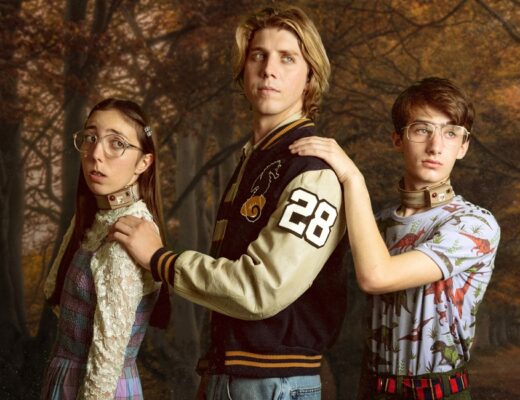Bertrand Mandico made quite a splash with his first feature-length film The Wild Boys in 2018, but he’s been making accomplished shorts for well over a decade. His latest, the 25-minute The Return of Tragedy is, in his own words, a “tribute to the New York underground cinema of the 80s.” Mandico clearly knows his film history: his movies, short and long, pay homage to Kenneth Anger, R.W. Fassbinder, Guy Maddin, the outsider art of Henry Darger, Jack Smith’s canonical Flaming Creatures, Christopher MacLaine’s The Man Who Invented Gold, and the poetic, esoteric Euro-smut of Walerian Borowczyk, amongst other avant-garde touchstones. Still, evoking the hardcore films of the ’80s post-No Wave scene by Nick Zedd, Richard Kern, and Lydia Lunch is a different vibe altogether, and Mandico doesn’t even begin to approach the genuinely dangerous, transgressive nature of those outré maniacs.
Then again, Mandico may not be trying to outdo his forebears: The Return of Tragedy plays more like a small-scale lark, the work of a bunch of friends fucking around over a long weekend. The loose, awkward staging resembles nothing so much as a porno, although Mandico scribbles all sorts of cryptic tomfoolery in the margins. Two cops break up a backyard meeting of some kind of cult, where an aged, near-unrecognizable David Patrick Kelly presides over some arcane ritual that sees Elina Löwensohn lying prone while her liver floats several feet above her, still attached to her body by a length of intestines. This is intercut with scenes of police interrogating Kelly and Löwensohn, and glimpses of a young woman roaming the streets, covered in sores and pustules (clearly made out of silly putty). Kelly is referred to repeatedly as “Kate Bush,” spouts gibberish about “the hypocrisy of teeth” and “the importance of pinched lips,” and declares that “a smile is not a peaceful act, it is a carnivorous statement.” Mandico is certainly not shy about painting the police as buffoonish. At one point the officers grow phallic mandibles on their noses, which they then furiously masturbate. Later, bystanders unfurl a “Fuck the police” banner and the soundtrack repeatedly intones “we don’t want to do anything to scare your children.” These cops are repeatedly stabbed and then reborn, the scenario repeating itself over and over in a kind of eternal return. Charged political statements notwithstanding, all this comes across as aesthetically playful: handmade special effects use lots of papier mâché and clearly visible strings, while the delicately grainy 16mm images have a soft, pastel feel. On the whole, The Return of Tragedy is perhaps a little too weird to fully explicate — there are orifices and wombs and anuses all over the place — but it’s a worthwhile experience all the same.
Published as part of Venice International Film Festival 2020 — Dispatch 2.







